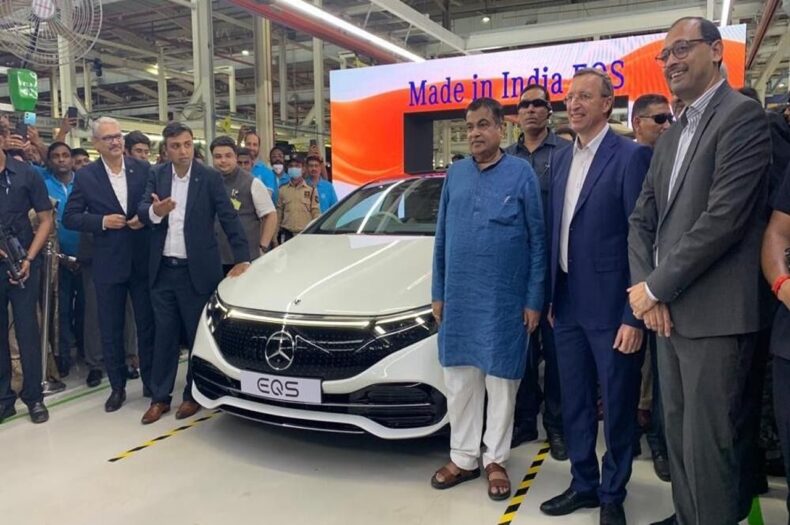Union Minister Nitin Gadkari on Friday requested German premium automobile maker Mercedes-Benz to create more cars in India, emphasizing that doing so lowers costs while also boosting affordability.

A comprehensive trade agreement between India and the European Union might pave the way for Mercedes-Benz to make more automobiles in the South Asian country, potentially turning it into an export powerhouse, according to Mercedes‘ national leader.
The European Union and India started free trade discussions in June, with the goal of concluding them by the end of 2024. The talks began in 2007 but were halted in 2013 due to a lack of agreement on topics such as the EU’s demand for wider access to Indian markets for its automobiles.
When asked about the German firm’s export intentions, Martin Schwenk stated in an interview that a trade deal that puts India in a competitive position or provides it with an advantage over other regions where Mercedes produces automobiles would “certainly assist.”
The Mercedes-Benz EQS 580, priced at INR 1.55 crore, is the company’s second electric vehicle and arrives in India as an SKD (Semi Knocked Down) kit to be constructed at the Pune facility. It has the longest range of any EV on the market in India, with an ARAI-certified range of 857 km. The WLTP (Worldwide Harmonised Light Vehicle Test Procedure) real-world circumstances range, on the other hand, is 677 kilometres.
The model is sold out for the year at the company’s Sindelfingen plant. There would be a waiting period for Indian customers as well.
Mercedes-Benz, also known as Mercedes and Benz, is a German luxury and commercial vehicle automotive brand founded in 1926.
Mercedes-Benz AG is a Mercedes-Benz Group company headquartered in Stuttgart, Baden-Württemberg, Germany. Mercedes-Benz AG manufactures consumer luxury vehicles as well as commercial vehicles under the Mercedes-Benz brand. Mercedes-Benz-badged heavy commercial vehicles (trucks and buses) will be controlled by Daimler Truck, a former subsidiary of the Mercedes-Benz Group that will become an independent entity in late 2021. Mercedes-Benz was the world’s most luxury vehicle brand in 2018, selling 2.31 million passenger cars.
The origins of the brand may be traced back to Daimler-Motoren-1901 Gesellschaft’s Mercedes and Karl Benz’s 1886 Benz Patent-Motorwagen, commonly considered to be the first internal combustion engine in a self-propelled automobile. The brand’s slogan is “the best or nothing.”
Gadkari, the Minister for Road Transport and Highways stated during the launch of Mercedes-Benz India’s first locally produced EQS 580 4MATIC EV at its Chakan production facility in Pune that the country had a large market for electric vehicles.
The Union Minister further added that only by growing Mercedes-Benz manufacturing will the corporation be able to cut costs. At the moment, the middle-class family cannot afford such a car.
According to Schwenk, producing a model at a single location would necessitate an annual volume of 150,000 to 200,000 cars.
Despite being India’s top premium manufacturer, Mercedes sold only 11,242 vehicles in 2021. It sold 15,500 units at its peak in 2018.
Martin Schwenk went on to say that the present strategy was not to export. They intend to totally electrify the portfolio and become an electric manufacturer in the next 8-10 years. The plan is to build the capability now and then grow the numbers based on how demand develops
India is primarily a small- and low-cost car market, with premium models accounting for less than 1% of total yearly sales of approximately three million vehicles. The premium EV market is significantly smaller and largely unproven, with most models now imported at exorbitant tariffs.
The EQS has a verified range of 857 kilometres (532.5 miles) on a single charge and will cost 15.5 million rupees ($190,564).













